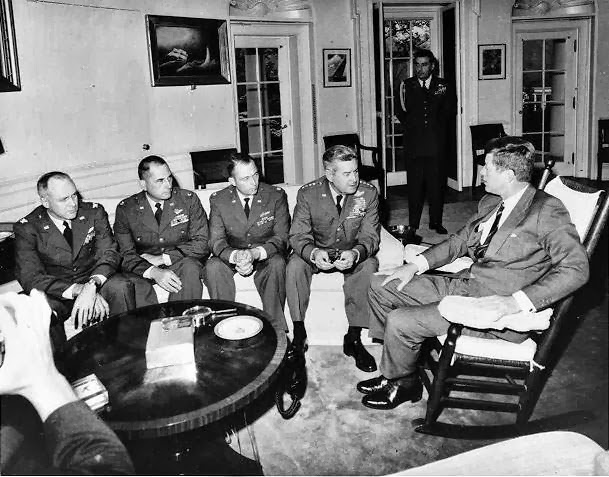October 19th in the Cuban Missile Crisis

Follow the inside story of the Cuban Missile Crisis as it evolves day by day from now through October 28!
Read: Yesterday Tomorrow Beginning of Series
(Photograph: JFK meets the reconnaissance pilots who flew the Cuba missions. Third from the left is Major Richard Heyser (see the October 14 in the Cuban Missile Crisis entry of this blog), who took the first U2 pictures. JFK is on the far right, with General Curtis LeMay immediately to his left.)
“As Bad as Chamberlain in Munich!” LeMay insults the President
Friday, October 19, 1962, was the fourth of the “Thirteen Days” Bobby Kennedy referred to in the title to his book about the Cuban Missile Crisis.
On this day, President John F. Kennedy met with the Joint Chiefs of Staff (heads of the US military branches) for the only time during the crisis. While the Executive Committee for National Security (ExComm), the White House executive group managing the crisis, had been leaning toward a “blockade Cuba” option, the Joint Chiefs argued for immediate airstrikes against the missile sites.
In that meeting, Air Force Chief of Staff Curtis LeMay went so far as to tell JFK that a blockade was “appeasement, as bad as Chamberlain at Munich!” This was a hugely insulting remark, since it was well known that Jack’s father Joe Kennedy’s political career had ended in part because he supported Chamberlain’s position of appeasing Hitler’s aggression.
A Note on the ExConn Tapes
As noted previously, JFK had ordered a recording system to be installed in the Cabinet room, which he could operate by pressing a button under the table. As a result, virtually all ExComm meetings were recorded; these recording were released to researchers and the public only in the last decade or so.
While many people think that Richard Nixon was the first president to tape White House conversations, the practice went back to FDR. The biggest difference between Nixon’s system and those of his predecessors was that the Nixon system was fully automatic, and earlier systems were turned on and off at the President’s discretion.
You can listen to some of the actual recordings here. For transcripts of the recordings, look here.
Guest post by Douglas Niles, author of Final Failure: Eyeball to Eyeball, an alternate history of the Cuban Missile Crisis. Doug and I co-authored three alternate history military thrillers: Fox on the Rhine, Fox at the Front, and MacArthur’s War. He is also known for his fantasy novels and is an award-winning game designer.